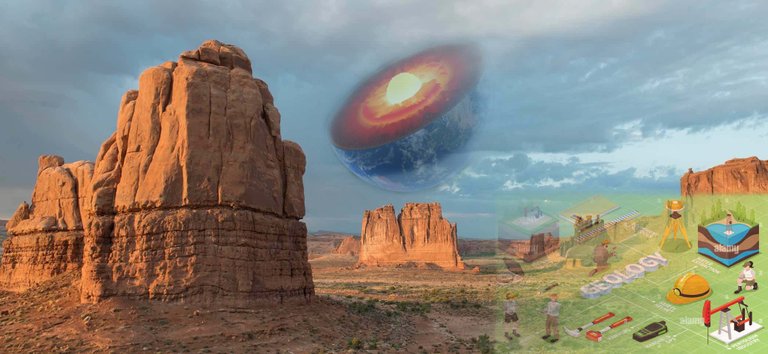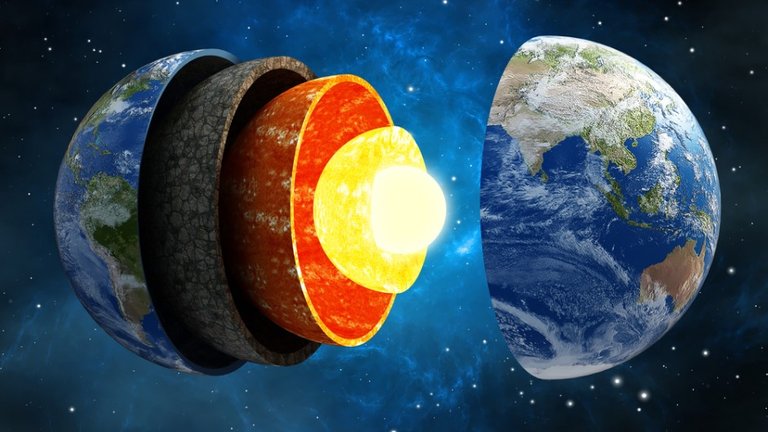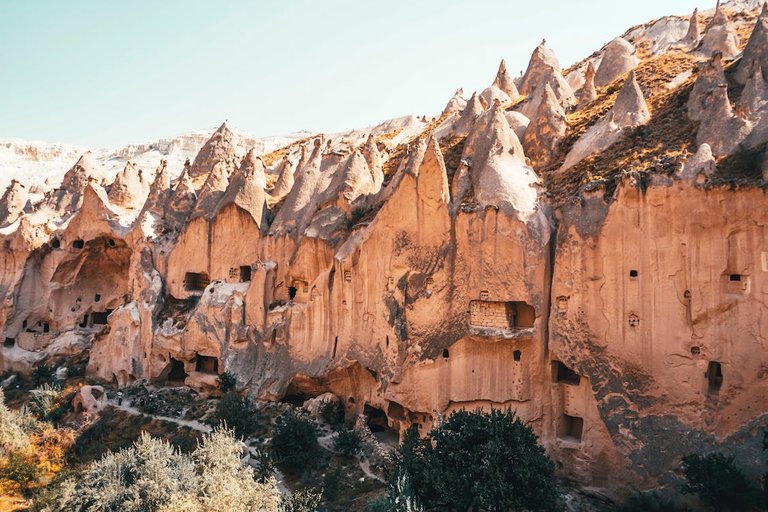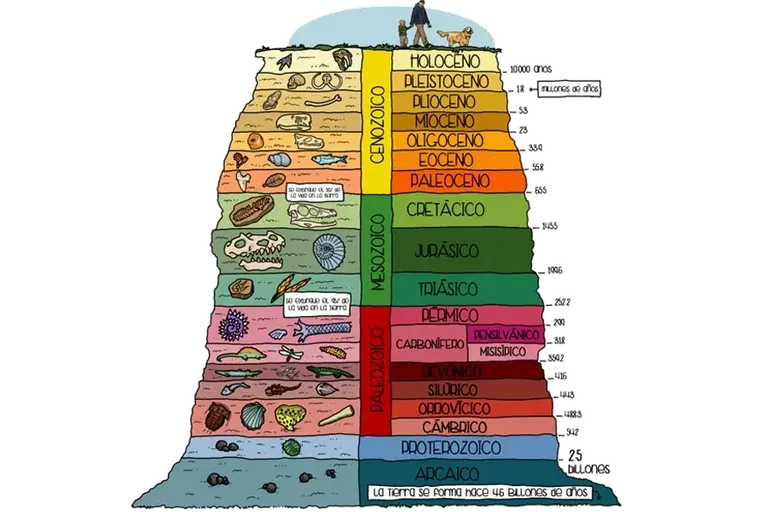Earth Secrets: Geology

Secretos de la Tierra: Geología
¡Hola, hola, Hivernautas! Nuevamente presente semana a semana. Esta vez les voy a presentar un post muy importante para el conocimiento general. ¿Se han preguntado sobre qué estamos apoyados? Es decir, los edificios, montañas, nuestro caminar, etc. Pues a simple vista parece obvia la respuesta, pero encierra un sin fin de algo llamado Geología.
Geología es una palabra derivada del griego que significa tratado de la Tierra. La geología es la ciencia que estudia la estructura, composición, origen, evolución y dinámica de la Tierra y otros planetas. Esta ciencia se encarga de comprender la manera en la que se formaron las rocas, minerales, también la forma en la que se mueven los continentes, la manera que varía las condiciones climáticas en el transcurso del tiempo y cómo los procesos geológicos dan forma a la superficie terrestre.

Composición de las capas de la Tierra. Créditos: ntuaseclub.files.wordpress
Los geólogos estudian la Tierra desde distintas perspectivas, entre ellas: la geología histórica, la geología estructural, la geología de recursos naturales, la geología planetaria y la geoquímica. Mediante la aplicación de la observación, la experimentación y el análisis de datos, los geólogos tratan de explicar los acontecimientos que se desarrollan en la Tierra y cómo estos procesos han dado forma al mundo que conocemos hoy en día.
La geología tiene aplicaciones en una amplia variedad de campos, incluyendo la exploración de recursos naturales, la ingeniería geotécnica, la gestión de riesgos naturales, la exploración espacial y la educación ambiental, entre otras.

Valle de Zelve región de Anatolia central, en Turquía. Créditos: Salih Altuntas de pexels.
En la antigüedad, la geología se hizo presente cuando los seres humanos comenzaron a hacer observaciones y registros de los fenómenos geológicos en la Tierra. En la antigua Grecia, filósofos como Empédocles y Aristóteles especularon sobre la naturaleza y origen de los volcanes y terremotos.
Durante la Edad Media, la comprensión de la geología se basó en la teología y la filosofía. Fue en la época del Renacimiento que los estudios geológicos comenzaron a ser más sistemáticos y basados en la observación y la experimentación. El naturalista italiano Leonardo da Vinci fue uno de los primeros en hacer dibujos detallados de las rocas y los fósiles.

Geometría, De Frans Floris. Créditos: Museo Británico.
En el siglo XVII, el científico y filósofo francés René Descartes planteó que la Tierra era una esfera sólida compuesta de capas, y en el siglo XVIII, el geólogo alemán Abraham Gottlob Werner desarrolló una clasificación sistemática de las rocas y minerales.
En el siglo XIX, el geólogo escocés James Hutton propuso la teoría de la uniformidad geológica, que establecía que los procesos geológicos que ocurren en la actualidad son los mismos que han ocurrido a lo largo de la historia de la Tierra. Esta idea fue ampliamente aceptada y se convirtió en la base de la geología moderna.

Hutton fue la primera persona en imaginar que el centro de la Tierra era una bola ardiente. Créditos: ISTOCK
Para el siglo XX, con los crecientes avances tecnológicos, como la datación radiométrica y la exploración geofísica, ayudaron a los geólogos recibir información precisa sobre la edad y la estructura de la Tierra, y también sobre otros planetas y cuerpos celestes. La geología también ha tenido un importante aporte en la comprensión de los procesos geológicos que han llevado a la formación de la vida en la Tierra.

Estructura sobre la formación de la Tierra hace 4.6 miles de millones de años. Crédito M. Madrid de geoplaneta.net
Algo que para muchos es desconocido o sin importancia se convierte en la clave en la evolución de la humanidad, por este motivo para la próxima entrega estaremos abordando más sobre este interesante contenido.
¡Hasta la próxima Hivernautas!
Créditos:
Imagen 1: Autoría propia. Realizada con base en imágenes libres.
Imagen 2: Fuente
Imagen 3: Fuente
Imagen 4: Fuente
Imagen 5: Fuente
Imagen 6: Fuente
Fuentes de consulta:
- https://infogeologia.wordpress.com/2017/07/23/james-hutton-el-blasfemo-que-revelo-que-la-verdad-sobre-la-tierra-no-estaba-en-la-biblia-y-nos-dio-el-tiempo-profundo/
- https://geoplaneta.net/datacion-radiometrica-definicion-fundamentos-y-fiabilidad/
- https://naukas.com/2017/06/01/la-matematizacion-de-la-naturaleza-o-el-ocaso-de-aristoteles/
- http://www.icog.es/TyT/files/geo_sociedad.pdf
- https://www.nationalgeographic.es/tema/contenido/ciencia/ciencias-fisicas/ciencias-de-la-tierra/geologia
English Edition

Earth Secrets: Geology
Hello, hello, Hivernauts! Again present week by week. This time I am going to present a very important post for general knowledge. Have you ever wondered what we are supported by? That is, the buildings, mountains, our walk, etc. Well, at first glance the answer seems obvious, but it contains an endless amount of something called Geology.
Geology is a word derived from the Greek meaning treatise of the Earth. Geology is the science that studies the structure, composition, origin, evolution and dynamics of the Earth and other planets. This science is responsible for understanding the way in which rocks and minerals were formed, also the way in which the continents move, the way that climatic conditions vary over time and how geological processes shape the terrestrial surface.

Composition of the layers of the Earth. Credits: ntuaseclub.files.wordpress
Geologists study the Earth from different perspectives, including: historical geology, structural geology, natural resource geology, planetary geology, and geochemistry. Through the application of observation, experimentation, and data analysis, geologists try to explain events unfolding on Earth and how these processes have shaped the world we know today.
Geology has applications in a wide variety of fields, including natural resource exploration, geotechnical engineering, natural hazard management, space exploration, and environmental education, among others.

Zelve Valley, Central Anatolia Region, Turkey. Credits: Salih Altuntas from pexels.
In antiquity, geology became present when human beings began to make observations and records of geological phenomena on Earth. In ancient Greece, philosophers such as Empedocles and Aristotle speculated on the nature and origin of volcanoes and earthquakes.
During the Middle Ages, the understanding of geology was based on theology and philosophy. It was at the time of the Renaissance that geological studies began to be more systematic and based on observation and experimentation. Italian naturalist Leonardo da Vinci was one of the first to make detailed drawings of rocks and fossils.

Geometry, By Frans Floris. Credits: British Museum.
In the 17th century, the French scientist and philosopher René Descartes argued that the Earth was a solid sphere made up of layers, and in the 18th century, the German geologist Abraham Gottlob Werner developed a systematic classification of rocks and minerals.
In the 19th century, Scottish geologist James Hutton proposed the geological uniformity theory, which stated that geological processes occurring today are the same as those that have occurred throughout Earth's history. This idea was widely accepted and became the basis of modern geology.

Hutton was the first person to imagine that the center of the Earth was a fiery ball. Credits: ISTOCK
By the 20th century, increasing technological advances such as radiometric dating and geophysical exploration helped geologists receive accurate information about the age and structure of the Earth, as well as other planets and celestial bodies. Geology has also had an important contribution in understanding the geological processes that have led to the formation of life on Earth.

Structure about the formation of the Earth 4.6 billion years. Credit M. Madrid from geoplaneta.net
Something that for many is unknown or unimportant becomes the key in the evolution of humanity, for this reason for the next installment we will be addressing more about this interesting content.
Until next time Hivernauts!
Credits:
Image 1: Autoría propia. Realizada con base en imágenes libres.
Image 2: Fuente
Image 3: Fuente
Image 4: Fuente
Image 5: Fuente
Image 6: Fuente
Reference sources:
- https://infogeologia.wordpress.com/2017/07/23/james-hutton-el-blasfemo-que-revelo-que-la-verdad-sobre-la-tierra-no-estaba-en-la-biblia-y-nos-dio-el-tiempo-profundo/
- https://geoplaneta.net/datacion-radiometrica-definicion-fundamentos-y-fiabilidad/
- https://naukas.com/2017/06/01/la-matematizacion-de-la-naturaleza-o-el-ocaso-de-aristoteles/
- http://www.icog.es/TyT/files/geo_sociedad.pdf
- https://www.nationalgeographic.es/tema/contenido/ciencia/ciencias-fisicas/ciencias-de-la-tierra/geologia
¡Enhorabuena!
✅ Has hecho un buen trabajo, por lo cual tu publicación ha sido valorada y ha recibido el apoyo de parte de CHESS BROTHERS ♔ 💪
♟ Te invitamos a usar nuestra etiqueta #chessbrothers y a que aprendas más sobre nosotros.
♟♟ También puedes contactarnos en nuestro servidor de Discord y promocionar allí tus publicaciones.
♟♟♟ Considera unirte a nuestro trail de curación para que trabajemos en equipo y recibas recompensas automáticamente.
♞♟ Echa un vistazo a nuestra cuenta @chessbrotherspro para que te informes sobre el proceso de curación llevado a diario por nuestro equipo.
🥇 Si quieres obtener ganancias con tu delegacion de HP y apoyar a nuestro proyecto, te invitamos a unirte al plan Master Investor. Aquí puedes aprender cómo hacerlo.
Cordialmente
El equipo de CHESS BROTHERS
To some people, they believe earth was former by creation process by God
To some they believe earth was formed by evolution
Yes, there have long been these two opposing positions on the origin of the Earth and life on it. Good thing we have science to clarify everything.
Thanks for your contribution to the STEMsocial community. Feel free to join us on discord to get to know the rest of us!
Please consider delegating to the @stemsocial account (85% of the curation rewards are returned).
You may also include @stemsocial as a beneficiary of the rewards of this post to get a stronger support.
Right now 'Earth Secrets: How to Prevent Earthquakes' would be a useful addendum :D What with all these earthquakes happening in Turkey and felt even where I live, in Cyprus, and causing widespread fear.
Unfortunately, today there is no way to predict such a phenomenon, but humanity has tried to reduce by potential prevention the damage caused by improvements in building structures or evacuation measures.
¡Felicitaciones!
1. Invierte en el PROYECTO ENTROPÍA y recibe ganancias semanalmente. Entra aquí para más información.
3. Suscríbete a nuestra COMUNIDAD, apoya al trail de @Entropia y así podrás ganar recompensas de curación de forma automática. Entra aquí para más información sobre nuestro trail.
4. Creación de cuentas nuevas de Hive aquí.
5. Visita nuestro canal de Youtube.
Atentamente
El equipo de curación del PROYECTO ENTROPÍA